“Page took the record that was playing on the turntable off without asking anybody and put on Jimi Hendrix: long tense organic guitar line that made him shiver like frantic electric ecstasy was shooting up from the carpet through his spine straight to the old pleasure center in his cream-cheese brain, shaking his head so that his hair waved all around him, Have You Ever Been Experienced?”
—Michael Herr, Dispatches
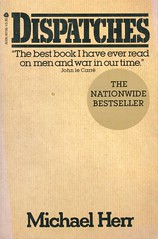 Dispatches
Dispatches
Michael Herr
![]()
The Vietnam War taught my generation to see war reporting for what it is: bullshit. As the reality of the war gradually became clear, we realized everything we were being told was propaganda: the light at the end of the tunnel, Charlie’s beat and he knows it, made-up body counts. Nothing’s changed. Those of us who lived through Vietnam believe not a word from Afghanistan, Aleppo, Mosul.
Today’s war reportage is even more propagandistic than the reportage from the Vietnam War. Journalists are embedded with military units, tightly controlled, not free to move around the front or rear lines; they pass on whatever meaningless statistics and talking points they’re given. In Vietnam, reporters could be free agents if they wanted to break free of their military minders, who were too busy to pay much attention to them anyway. Michael Herr and a few others did just that.
Some describe Herr’s war reporting as “disciplined gonzo.” I agree. His writing is personal without being self-centered: above all, he was a reporter. During Herr’s time in Vietnam, he wrote for Esquire (hardly an underground countercultural rag, but not a willing funnel for pro-war propaganda either), and several short pieces appeared there. Nearly a decade after returning from Vietnam, he wrote “Dispatches,” and later contributed to two major Vietnam War movies, “Apocalypse Now” and “Full Metal Jacket.” I mention the movies to remind you that you know Herr’s work even if you never read “Dispatches.”
The experience of reading “Dispatches” in 2016 is no different than than it was reading it in 1977, the year of its publication. It’s as fresh now as it was then. It is, quite simply, the best book written about the Vietnam War, and remains the benchmark for war reporting today.
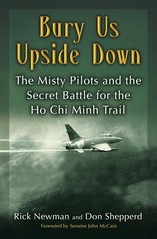 Bury Us Upside Down: The Misty Pilots and the Secret Battle for the Ho Chi Minh Trail
Bury Us Upside Down: The Misty Pilots and the Secret Battle for the Ho Chi Minh Trail
Rick Newman & Don Shepperd
![]()
This is an outstanding history of the Misty FAC (forward air controller) squadron and its pilots during the Vietnam war, a legendary unit active for just three years, from 1967 to 1970.
I’ve been reading up on the air war in Vietnam. When I went through USAF pilot training in 1973-74, my instructors were pilots who had flown in Vietnam. Some were River Rats, some were former Raven FACs, some had been Wild Weasels, some were returned POWs. During my subsequent flying career, these men were the operations officers and commanders I flew for. My first F-15 squadron commander (a man who later attained four star rank and served as USAF chief of staff, Ron Fogleman) was a Misty FAC.
Every Vietnam war aviator I’ve known speaks of the Misty FACs with admiration. Officially known as Commando Sabre, the Misty FAC squadron was part of the 37th Tactical Fighter Wing at Phu Cat, flying two-seat F-100Fs. Misty pilots were “fast FACs,” flying single-ship missions over North Vietnam in search of high-priority targets for Air Force, Navy, and Marine fighter-bombers, going after those targets themselves with the minimal ordnance they carried when no help was available. It was a high-risk mission with a daunting loss rate. There were 157 Misty FAC pilots. Of that number, 34 were shot down. Three of that number were captured and held as prisoners of war. Seven were killed.
Misty was an all-volunteer unit, recruiting highly experienced pilots who wanted to do more than bomb dirt. Newman and Shepperd (himself a former Misty FAC) describe the day-to-day operations of the unit, going into detail on specific missions, especially those where pilots were shot down … some rescued, some taken prisoner, some killed, some to disappear altogether, their fates still unknown.
When I write about flying, I try to convey the experience and environment without condescending to readers by over-explaining the minutia of aircraft and procedures. If the writing is good enough, readers will figure it out. Newman and Shepperd do this masterfully. As an experienced fighter pilot, I was enthralled. At the same time, I won’t hesitate to push this book on friends who know nothing about aviation or the military.
The authors fill in as many gaps as they can, describing the experiences of unit pilots who were captured and moved to prison camps in North Vietnam, the heroic but doomed escape attempts made by some of the POWs, the reactions of pilots who watched their brothers being shot down and the extraordinary efforts they made to cover downed aviators until rescue could come, the heartache and anger they felt when enemy gunners kept the rescue helicopters at bay and their brothers were taken or killed.
I particularly appreciated the attention the authors paid to the wives and children of the Misty pilots who were declared missing in action. They were not to learn if their husbands and fathers had survived and been taken prisoner until the final peace treaty was signed in 1973. For those whose loved ones did not come home with the POWs, hope, fear, and frustration might last a lifetime.
I have to say, this is one of the best Vietnam air war books I’ve read.
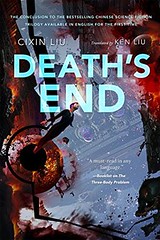 Death’s End (Remembrance of Earth’s Past #3)
Death’s End (Remembrance of Earth’s Past #3)
Liu Cixin
![]()
In my review of the first book of this series, “The Three-Body Problem,” I said this:
“… I wondered if a novel like this would be written in the USA or UK today … in many ways it’s old-fashioned, even Asimovian (though not as sweeping as Asimov’s Foundation trilogy).”
Now that I’ve finished the final book of the trilogy, I’m forced to retract that comment. Liu Cixin’s vision is far more sweeping than Asimov’s. If I had to search for a touchstone to compare it to, I would cite Olaf Stapledon and his seminal SF novel “Star Maker”: it’s that grand in concept.
Naturally, extrapolations based on quantum physics are plot devices in science fiction, and Liu Cixin’s SF is no exception. While I loved “The Three-Body Problem,” the same plotting techniques began to irritate me in the second novel, “The Dark Forest,” and in the final novel one fantastic (and oh so convenient) deus ex machina follows another at such a rapid pace it’s like going from a standstill to light speed, then on into uncharted, unknown dimensions … giant leaps, each one coming faster than the one before. Along with that, the plotting becomes obvious. Of course this would happen, and then that, and then this. In other words, I thought the end of the trilogy was highly contrived.
So why four stars, one of my highest ratings? Because this is old school SF, masterful old school SF at that. It’s full of wonder and grand visions, and if the plotting is contrived and obvious, show me a classic SF story where it isn’t. Reading each book of the trilogy, I felt like a kid again, huddled under the covers with Asimov and a flashlight, mumbling “wow” and “far out” into the night, unable to stop flipping pages.
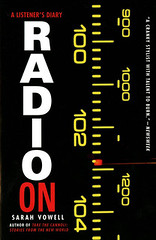 Radio On: A Listener’s Diary
Radio On: A Listener’s Diary
Sarah Vowell
![]()
I finally worked my way backward to Sarah Vowell’s first published book, “Radio On: A Listener’s Diary,” written when she was in her mid-20s. A one-year diary, it’s a near-daily recounting of her reactions to what she listened to on the radio during 1995: top 40, talk, drivetime, alternative, country, religion, farm reports, underground, NPR, 20-watt college stations.
Naturally, a lot of what she listened to was news and opinion, and as an aside, I was struck by the political similarities between one Democratic administration (Clinton) facing the rise of a Republican Congress and another (Obama). But back to the book:
Of all Sarah Vowell’s books, this might be the one I most favor. It is the most personal, the most unpolished, the most honest. I too have lived with radio as a constant backdrop, and I too have pondered the importance of radio in our lives. I’m considerably older than Sarah and never listened to the music she favors, but her diary compelled me to get on YouTube and listen to several of the artists and tracks she mentioned as being important in her life. I was a long-time listener and fan of NPR, Garrison Keillor, and Car Talk, only later in life growing weary of the repetitive blandness; Sarah disliked and distrusted the whole crew from the get-go. Starting into her diary my thought was “Okay, we’ll agree to disagree”; by the end, it was “I quite see your point.”
As I said in a review of one of her later histories, I’ll read anything Sarah Vowell writes. I feel I know her better after reading “Radio On,” and that was more than worth the experience.
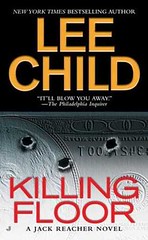 Killing Floor (Jack Reacher #1)
Killing Floor (Jack Reacher #1)
Lee Child
![]()
I read a long article about Lee Child and the Jack Reacher series in a recent New Yorker. Since the same magazine had previously introduced me to such brilliant writers as Patrick O’Brian and Tana French, I decided to read one of Lee Child’s Jack Reacher thrillers.
Reader, I inhaled it. That’s not to say Lee Child is a brilliant writer. He is what most of us would call a hack. But how refreshing it is, once in a while, to read a first-person, reasonably well-plotted and action-filled thriller where the bad guys get what’s coming to them and justice prevails.
I was reminded of John D. MacDonald’s Travis McGee novels, which I likewise inhaled in the 1980s. There are plenty of hard-boiled detective tropes, not a little Sherlock Holmes, and plenty of Hulk. You can criticize the plot for being contrived and unlikely, but you can say the same thing about most action-hero thrillers. I like Lee Child’s plain language and direct writing style. The pages turn almost of themselves.
Yes, I will read more. This is pretty good stuff.
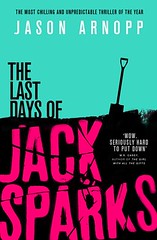 The Last Days of Jack Sparks
The Last Days of Jack Sparks
Jason Arnopp
![]()
Three-and-a-half stars for Jason Arnopp’s writing and the semi-epistolary style of the novel, which I enjoyed.
If I were rating Jack Sparks himself, I’d give him something in the minus range: Just as in real life, I loathe fictional drunks and druggies, no matter how important they may be to the story. Jack Sparks is both, and even without the addictions he’s contemptible. He’s the classic unreliable narrator as well, but even the most gullible reader will see right through him. I kept wishing for him to get the comeuppance he so richly deserved (satisfyingly, he does).
If I were rating the plot, which is centered on the supernatural, I’d go with two stars, entirely for selfish reasons: ghosts and devils are not my thing. Still, there were interesting moments here and there, spaced in such a manner that I kept reading.
If you can stomach a self-centered douche like Jack Sparks and you have a taste for the supernatural, you’ll probably find this a fun read, as many other reviewers did. Not my thing, though, and as for the humor so many other reviewers mention, it escaped me.